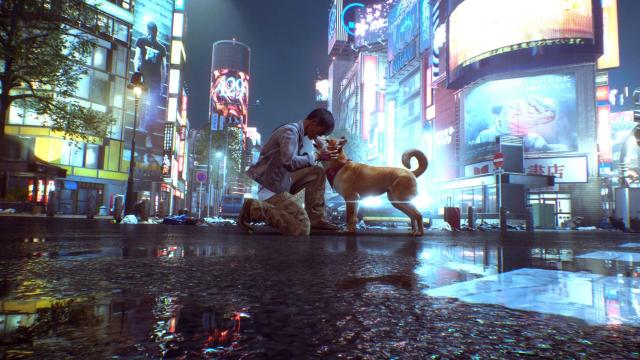Ghostwire: Tokyo, Tango Gameworks’ new action-adventure game with immersive sim-like elements, is a frustrating juxtaposition of highs and lows. It’s at once a compelling narrative about loss and the lengths we go to recover that which is gone, and a plodding first-person shooter with seriously underwhelming enemy AI. Its world is richly detailed and compelling, with some good side quests to discover; poignant, impactful stories featuring people who have waited god knows how long to reunite with their loved ones. But it’s all weighed down by uninspired combat that sees you running-and-gunning spirits down like it’s Call of Duty. I’m bummed because I was so stoked for it, too.
A thick, mysterious fog just rolled through the streets of Shibuya, leaving nothing behind of anyone who touched it except for their physical belongings. Think clothes, handbags, phones, stuff like that. Ghostwire: Tokyo puts you in the shoes of Akito, a young adult who survived this strange cataclysmic event dubbed the “mass vanishing.” However, not unlike Yuji Itadori in MAPPA’s excellent manga and anime Jujutsu Kaisen, Akito has a strange affliction–a spirit passenger riding shotgun in his body for his own selfish reasons, and somehow this passenger, a detective named KK, makes Akito immune to the fog. With KK now living rent-free in his body, Akito gains access to a whole new skill set, including the ability to see spirits and the power to shoot elemental blasts from his fingertips. He’d be pretty fun at parties, if only there were still parties to go to. The two then set out to uncover what caused the mass vanishing incident and figure out how Akito can save his sister, Mari, who suffers from a mysterious plight and has been captured by the villain for their own nefarious purposes.
The narrative has weighty implications. It’s an introspective meditation on grief and what someone will do to reunite with their loved ones and friends in death or, if possible, bring them back before they die. There are myriad side quests that underscore the game’s themes. For instance, in the third chapter you meet a spirit waiting for her boyfriend’s spirit to get off work, except he can’t because he died. At work. And he’s cursed to stay at this shitty corporate job, but she waits for him anyway. Lifting the curse — purging a specter emitting negative energy by weaving hand signs — reunites the two lover spirits, and their souls dissipate in heartwarming bliss. It’s a touching moment that left me teary-eyed. But getting to that quest — and others like it — is a chore since the game’s combat is so weak.
Ghostwire: Tokyo’s battles are a slog. Not because they’re challenging to understand or difficult to master, but because the combat is simply boring. Enemies are dumb, charging you head-on or slowly walking in circles around you. Known as Visitors, ghastly apparitions that resemble humans minus the physical body, these sponges barely put up a fight. Even when they outnumber you, they’ll often attack one-by-one instead of coordinating to force you to switch up your tactics.

There are a small number of spells at your disposal, but aside from a slow-moving fire grenade, nothing is as effective as the starting wind spell that functions like a pistol. What you’re doing most of the time in combat is walking away — there are no evasive moves such as a dodge or sidestep — and firing off wind bullets. Rinse and repeat this for six chapters, with the occasional boss fight thrown in that’s the same thing but longer, and Ghostwire: Tokyo turns out to be a repetitive first-person shooter. And unfortunately, rather than being a relatively minor element in a game that puts primary emphasis on exploration and discovery, combat is one of Ghostwire’s central pillars.
It’s a bummer, too, because Ghostwire: Tokyo’s world is truly fascinating. Though they’re devoid of actual life, Shibuya’s rain-soaked alleys and neon-lit streets feel lived in. There’s food left in microwaves and refrigerators. Apartments have clothes strewn on the beds. Cats and dogs, somehow spared from the great vanishing, hang out around town. There’s history here, and not just because everyone suddenly disappeared. You get to learn about the people who inhabited this world by picking up interactive items like computers and satchels, all of which reveal the inner workings of their lives just before they all evaporated. It’s heartbreaking, relatable, and funny. Tango Gameworks baked in some genuinely intriguing storytelling and world-building that’s marred by insipid combat.
I appreciate that Ghostwire: Tokyo is trying to do something a little different. Its minimalist approach to combat could have been refreshing in an industry so intent on stuffing games with more of everything. It’s the rare open world that, while it has an icon-littered map, isn’t anywhere near as egregious as many of its contemporaries. It respects your time, doesn’t overcomplicate its mechanics, and can be completed in 20 or so hours, making it arguably the antithesis to modern AAA design. But for as simple as the game’s battle system is, it just isn’t all that fun or interesting to actually participate in. The hook here is the setting, lathered in Japanese folklore and modern sensibilities, not its one-dimensional, first-person shooter mechanics.
Truthfully, that’s the real letdown. All the promotional material, from screenshots to trailers, had me thinking Ghostwire: Tokyo was some supernatural adventure thriller about freeing apparitions and tracking ghosts. I was under the impression there was no — or very little — combat and that most of the game would have been spent piecing together a mystery like a spirit detective from Yu Yu Hakusho. Some of that is true. Those moments, following clues to discover the location of a curse and lifting it, are among the most enthralling parts of the game. Ghostwire: Tokyo even has one of the coolest healing mechanics in games right now. It’s just a shame that such a mesmerising world is overshadowed by such bland combat.

Leave a Reply